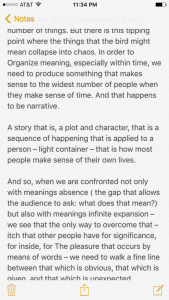INT. A BAR – EVENING
Thomas sits down in the only empty seat left in the bar. He turns to attract the bartender’s attention and realizes that Allie is sitting beside him. She’s sitting alone, reading an old paperback copy of Leonard Cohen’s “Beautiful Losers” and smoking a cigarette.
THOMAS
I know you.
Allie glances over at him. Shakes her head and reaches for her beer.
ALLIE
I think you must be mistaken.
She takes a generous swig, sets her glass down and returns her attention to her book, dismissing him.
BARTENDER
(to Thomas)
ID?
Thomas pulls out his wallet and hands over his ID. The bartender gives it a quick glance then hands it back.
BARTENDER
Whatcha havin’?
THOMAS
A whiskey for me and —
Thomas looks at the beer in Allie’s hand.
THOMAS (CONT’D)
And one more of whatever she’s having.
The bartender leaves only to return a moment later. He sets the drinks down.
BARTENDER
$10.00. You wanna start a tab?
Thomas looks at Allie and smiles.
THOMAS
Yeah, may as well.
Thomas passes over his credit card then turns toward Allie and raises his glass for a toast.
THOMAS
Cheers.
With a sigh, Allie sets her book down and turns to face him.
ALLIE
I don’t cheers with strangers.
THOMAS
You’re forgetting that I’m not a stranger. We know each other, you and I.
Thomas sets his drink down. Sighs dramatically.
THOMAS (CONT’D)
But you’re right. We haven’t met before. At least, not officially.
Allie frowns as she taps out her cigarette.
ALLIE
I’m sorry. Have you seen me somewhere before or something?
THOMAS
I’ve seen you several times now but simply saying, “I’ve seen you before” doesn’t exactly do our situation much justice, does it?
ALLIE
Our situation?
THOMAS
I know you! And you know me. No, don’t make that face. You do know me. We know each other. We see each other every Tuesday.
Allie downs the last of her first beer and reaches for the one Thomas bought her. CLOSE ON her fingers wrap around the cool glass. She raises a brow and glances at Thomas. He’s got a big grin on his face. Allie releases her hold on the glass and pulls out another cigarette.
THOMAS
Can I bum one of those?
ALLIE
No.
THOMAS
I just bought you a drink.
ALLIE
We’re in a bar, dumb ass. You can’t smoke in here.
She pulls a matchbook out of her jacket pocket, lights her cigarette, and points to a sign over her shoulder which reads: NO SMOKING.
ALLIE (CONT’D)
And I didn’t ask you to buy me that drink, so I don’t owe you anything. What do you mean, you see me every Tuesday?
THOMAS
I wasn’t trying to imply that I think you owe me anything. I was just hoping you’d be nice. And you’re smoking in here.
ALLIE
I’m special. And I’m not nice. Not to strangers, anyway. Which you still are. You say you see me every Tuesday?
THOMAS
Every Tuesday.
ALLIE
(skeptical)
Where do you think you see me every Tuesday, Thomas?
THOMAS
Ha!
Thomas slams his hand down on the counter and smiles.
THOMAS (CONT’D)
So you finally admit it. You know me.
ALLIE
I never said that.
THOMAS
And I never gave you my name.
Allie shrugs and takes a drag off her cigarette.
ALLIE
I guess the jig is up.
THOMAS
That was no jig. You were just being cheeky. Here.
Thomas slides Allie’s glass closer toward her, then raises his own.
THOMAS (CONT’D)
You don’t have to finish it but considering the fact that I bought you this beer I think the least you could do is cheers with me.
(beat)
Just one cheers. That’s it. One cheers and I’ll leave.
ALLIE
Do you even know my name?
THOMAS
No, but I don’t have some weird rule about cheering with strangers. That’s your deal.
Allie laughs under her breath and shakes her head. She looks at Thomas, as if seeing him clearly for the first time.
ALLIE
Allie. My name is Allie.
Thomas smiles back at her.
THOMAS
Well, Allie. Let’s cheers.
(beat)
To chance encounters prompted by tragic circumstance and our shared inability to make a marriage work.
ALLIE
You know most men typically just say cheers.
THOMAS
I’m not most men.
ALLIE
I’ll cheers to that.
THOMAS
I’ll take it.
They clink glasses and drink.


